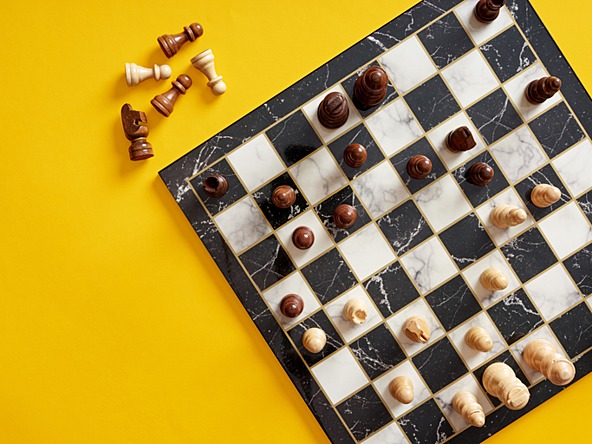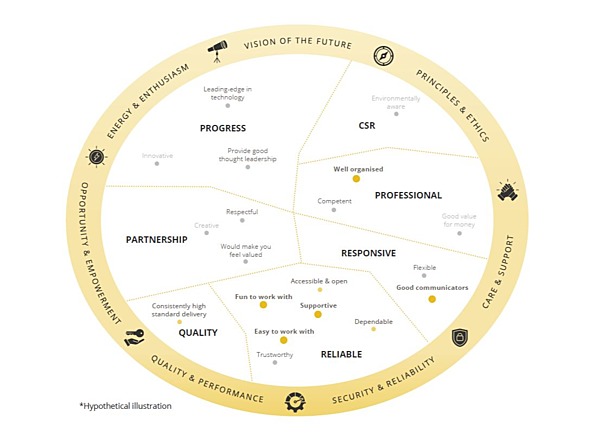Playing the long game – do we really know our true potential?

I had a serendipitous experience recently where an old client, mixed-used property developer Muse got in touch with me (yes that way round!) to tell me about the impact our brand research from six years ago has had on its company.
Our research aimed to understand how the Muse brand was perceived by its customers and prospects. We used a mixed method approach comprised of remote depth interviews, followed by a CATI (computer aided telephone interviewing) survey with 200+ customers and prospects including local authorities, landowners and lawyers.
We then conducted a brand analytics analysis to map the landscape of perception attributes and aligned it to our brand impressions framework (see Fig. 1). Driver modelling also identified the most important attributes for driving brand consideration. The outcome – there was clear evidence of Muse’s brand heartland, but clear opportunity areas also identified that represented consumer needs that were not emphasised by any competitor brands.

Fig. 1: Transform’s brand impressions framework
While this was six years ago, the changes made in a subsequent rebrand based on our recommendations have resulted in the company growing in scale and reputation. Muse’s development pipeline, for example, increased by 128% – from £1.8bn at the time of the rebrand in 2023 to £4.1bn in 2025. The number of live projects during the same period has grown from 16 to 31, and the company has also doubled its LinkedIn and Instagram follower numbers.
This experience made me think – had Muse not reached out to us, I would never have been aware of the impact our research had had over the longer-term. Having worked agency-side in this industry for over 20 years, I’m well accustomed to the fast pace of our work and often multitude of demands on our time. We move from one project to the next, at pace, focused on the short-term impact – namely successful delivery and client satisfaction. While we have project retros, etc, the feedback loop on ad hoc projects often stops there.
Herein lies the issue. Imagine the collective loss of long-term impact statistics such as this across our industry – changes that we have helped to bring about?
Much of the publicly available statistics on the research insight and analytics industry alone focus on value in terms of revenue for buying our services – with the UK said to have a sterling value approaching £9bn[ 1 ] in 2024, but statistics on the impact (and true worth) of our work are patchy at best.
You may find individual case studies, but not collective evidence, as far as I (or ChatGPT et al) am aware – and this is the question we are most asked by private sector clients: “What will the impact of doing this research be in terms of ROI so we can get buy-in from wider stakeholders?”
Surely if we all invest the time to better capture the longevity of impacts when clients take our research recommendations forward, we would then put our industry in a stronger position overall.
"We move from one project to the next, at pace, focused on the short-term impact – namely successful delivery and client satisfaction."
It feels to me that this is not a space where agencies should compete against each other on, rather an opportunity to work together, with MRS, to showcase our true potential as an industry.
So, how might we do this? A few solutions come to mind:
- Defining industry agreed long-term impact measurements, eg company revenue, sales conversion rates, customer acquisition/retention – obviously, these would vary across different project types but having a standardised set of measures covering all would be a starting point to ensure we’re collecting consistent and comparable data (eg across brand, CX and UX projects).
- Focusing more on the longevity of relationships between clients and agencies – once we have a standardised set of measures, these could then be conveyed to clients at the outset of any project, and we could collect benchmark data, with permissions to check in at longer-term intervals agreed upfront (to check whether recommendations have been actioned and for follow-up data to be shared at industry level with MRS). This would require endorsement from MRS and perhaps a consistent clause added to our statements of work.
- Creating a centralised database of metrics (owned by MRS for members only) – split across different types of research and industries which agencies and clients alike with MRS membership can add to, eg updating figures annually.
- Building AI tools to use the log of evidence collected to be able to rapidly summarise and easily visualise the impact within specific sectors/types of research and predict future trends – for example, if a client was looking for stats on the actual impact that UX research has had on usage rates or sales conversions, they could find out near instantaneously.
While Muse has recognised the role our work has played in their success, research still, in many places, seems to be a best kept secret to business success. Those of us who work in the industry know it is the foundation for effective strategic decision-making – from which everything else should follow. But we need the evidence to make this known more widely.
A colleague recently said, upon being promoted at Transform, “we rise by lifting others”. This seems so apt for our industry – it feels like we need to work together to capture and share the long-term impacts from our clients, to be truly recognised as a vital part of every business’s success. Who’s in? I am.
Samantha Elliott is principal researcher at Transform
Reference:
[ 1 ] Industry size and growth rates | Market Research Society

We hope you enjoyed this article.
Research Live is published by MRS.
The Market Research Society (MRS) exists to promote and protect the research sector, showcasing how research delivers impact for businesses and government.
Members of MRS enjoy many benefits including tailoured policy guidance, discounts on training and conferences, and access to member-only content.
For example, there's an archive of winning case studies from over a decade of MRS Awards.
Find out more about the benefits of joining MRS here.












0 Comments